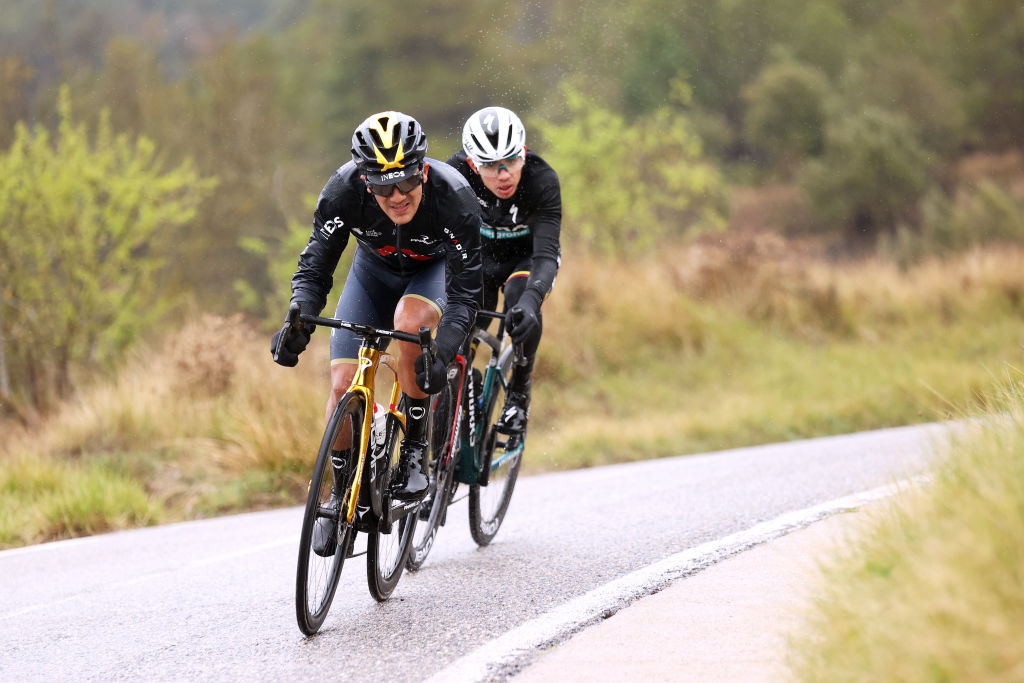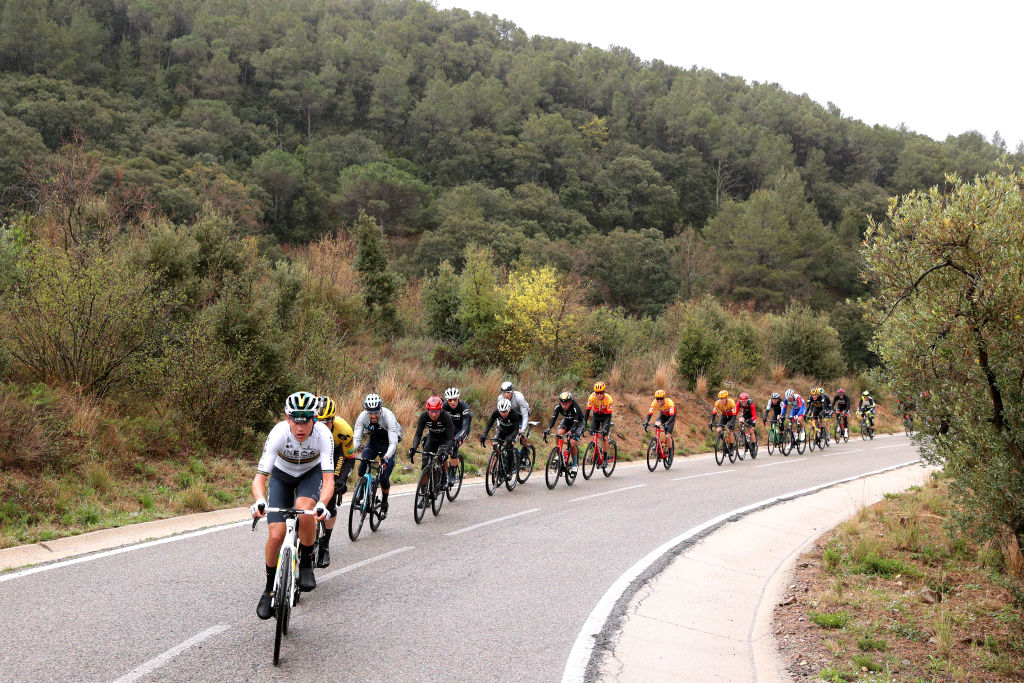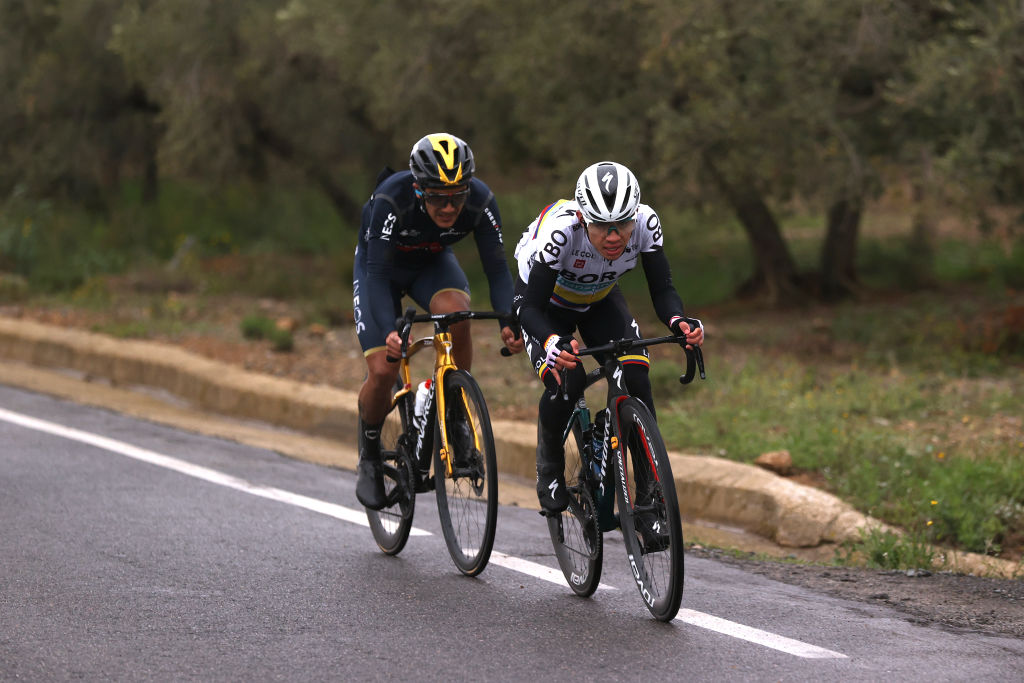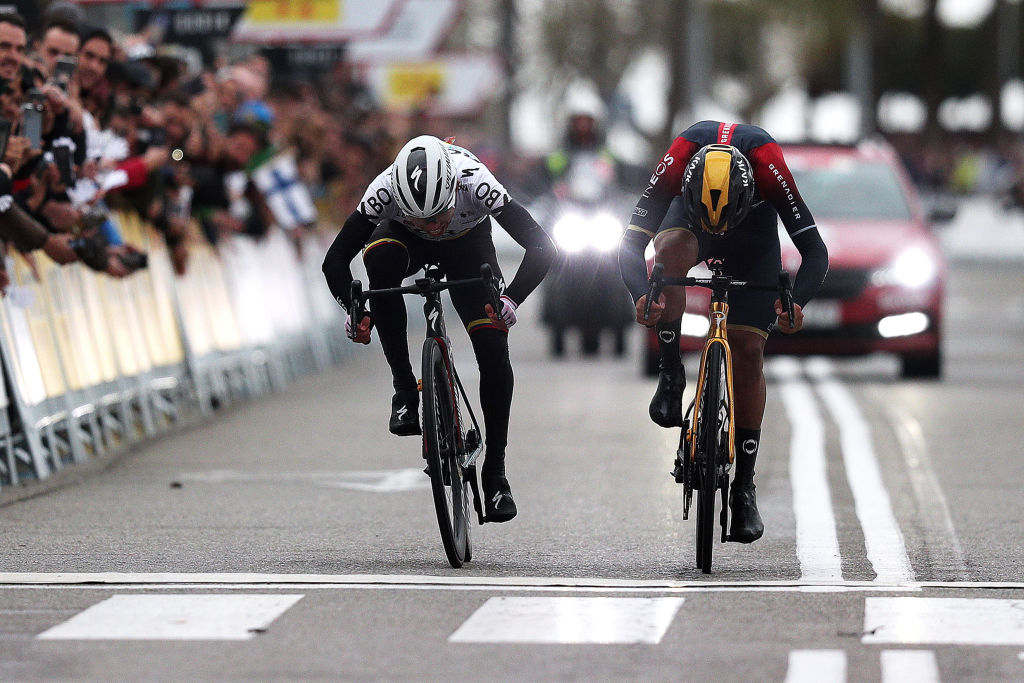How Higuita and Carapaz blew the Volta a Catalunya apart
Ineos and Bora directors Lancaster and Pomer explain the 130km attack that won stage 6

In recent years, you could probably count on one hand the number of stage races that have seen GC favourites take the race apart with attacks of well over 100 kilometres.
But in an extremely volatile Volta a Catalunya, with no fewer than six riders leading the race in six days, that's exactly what happened on Saturday's stage 6.
A joint attack by Richard Carapaz (Ineos Grenadiers) and Sergio Higuita (Bora-Hansgrohe) on the first category climb – 130km from home – opened up a rain-soaked stage through the little-known sierras of southern Catalunya. In turn, that consolidated into a move that left race leader João Almeida and UAE Team Emirates on the back foot, largely isolated, and finally defeated.
Come the finish, as Carapaz and Higuita – previously third and ninth overall at seven and 27 seconds respectively – crossed the line, they had almost a minute on a shattered main chasing group.
But it didn't matter. On a day when the Ecuadorian and the Colombian tore up the usual script of how major stage races can be won and lost, Higuita had moved into the lead while Carapaz was second overall and had captured the stage win to boot.
More to the point, as Higuita told Spanish website Zikloland, "it's a stage I'll be able to tell my children about."
For such a move to work out – and it's yet another timely example for race organisers of how summit finishes do not have to provide the most spectacular racing – one factor was definitely the route of the stage.
The latest race content, interviews, features, reviews and expert buying guides, direct to your inbox!
Hardest at the start, with a first-category climb of the Col de les Llebres in the first 40 kilometres, the rest of the day was a non-stop toboggan of winding, undulating roads through the Prades mountain range above the start and finish towns of Salou and Cambrils. Throw in bucketing rain, a peloton already seriously weary after five days of hard racing, and a very tightly packed GC standing even after two days in the Pyrenees, and you had plenty of raw fuel for the race to catch fire as it did.
But the decision to actually go for it, Ineos Grenadiers directeur sportif Brett Lancaster tells Cyclingnews, came about in his case after he began mulling over what the British squad could do with Carapaz in terms of GC following stage 5, when the team were down to four riders.
"I was thinking about it a lot Friday night and I went to the other two directors and said 'I've got a little bit of an idea guys, it's out there, but we've got nothing to lose and what do you reckon?' And I also talked to our race coach, Mikel Artetxe, who's Carapaz's trainer too."
Key to it all was having a strong rider to break the race apart early on, and in this case Luke Plapp was the ideal solution.
"I knew Luke has been fresh at the starts, suffering at the ends just because he's new to this WorldTour stuff so I called his coach and asked him what power he could sit on for a 20-minute climb and asked if he could go all-in," Lancaster said.
"Then there was the foul weather to consider so we thought 'let's make sure everybody is well fuelled and had jackets at the top of the climb and so on. And we'd give it a shot."

Once Carapaz, Higuita and Plapp were driving hard up the first-category climb, shredding the field to bits, as Higuita later said, he became the only survivor of the initial Ineos Grenadiers battle plan. But he wasn't there by chance, either.
"We've struggled a bit in the last couple of weeks and here it was extremely important for us to perform at the highest possible level," Bora-Hansgrohe directeur sportif Cristian Pomer told Cyclingnews.
"Today [Saturday] was the plan to go for the overall lead with Sergio, and as every cycling fan can imagine it was not our plan to go on the first climb.
"But our recon car with Bernie Eisel said that there was a lot of tailwind on the first climb after the hairpins and we wanted the guys to be up front. Then it was clear that with the wet winding roads it was going to be really complicated in the back, and that was even more so we saw that Almeida was dropped and the UAE team was in trouble."
Once the plan was moving, the key was to commit, Lancaster said, even if Plapp was suffering in the bad weather.
"They pushed on at the front and Luke got a bit cold. He was left out there with Higuita and Carapaz – it was very hard out there," he said. "But it was a very twisty day and I knew it'd be hard for teams to come up from behind. So," he said with a chuckle, "it was the master plan that paid off."
The general exhaustion that is currently affecting many riders in the Volta had its beneficial effect for those still strong enough to make the most of it, Pomer recognised.
"Not only tired bodies – I think a lot of dead bodies. When you look at the start list so many teams have abandons. There are not many teams here with more than six riders" – only Euskaltel-Euskadi of the 23 squads are fully intact – "That made it also more likely to have a chance of the breakaway to get to the finish."

On top of that, once Plapp had done his work and sat up exhausted, the two riders similar physical build made them a good match on the move, in terms of aerodynamics and effort put it.
So it was less likely one would drop the other, and indeed they stayed together until the finish in Cambrils a full three hours further on. It was symbolic, too, of their strong collaboration that immediately after the finish, the Colombian and Ecuadorian exchanged a quick hug of mutual thanks.
"Higuita was good on the wet descents" – where Carapaz struggled slightly – "because Carapaz crashed on the first day so his confidence might be down a bit," Lancaster pointed out.
"Then strategically it wasn't a big risk for us on GC; because we had Carlos Rodríguez sat on [in the chasing group] and with his own GC options. And we pulled it off, mate.
"They were a perfect match, they also speak the same language, and it's also good physically because they're not the biggest guys either, so aerodynamically they were the perfect match because otherwise they would have been dead at the finish," added Pomer.
The two directors did briefly talk behind about how their two riders, normally rivals, would race in an alliance for the day, Pomer confirmed.
"I had a chat with Brett in the Ineos car when the gap got up 3:30 and he was pretty certain it could go all the way. But I didn't let my guard down right up until the last kilometre of racing."

With Higuita now in the lead, Pomer is confident of Bora-Hansgrohe's chances of defending the lead, although he recognises, "We have to stay because as we all know in Catalunya in this last stage on Montjuïc you can lose a lot of time still, but we are pretty confident we can bring it home."
Yet whatever happens in Barcelona on Sunday, stage six of the Volta a Catalunya will linger long in fans memories, particularly as it was a day which if hard, did not look as it was likely to see a GC battle unfold.
"It was a bit like those attacks [Alberto] Contador did," Lancaster said, referring to the historic move by the Spanish GC racer in the Vuelta a España of 2012 when he ripped the race apart on a theoretically straightforward hilly stage to Fuente Dé.
"UAE gave it everything and rode really well, but we had to look at what their weaknesses might be. I know that Carapaz and Carlos are both good in the cold, so my idea was 'let's use this to our advantage and see where we end up.' Carapaz and these guys that can recover and recover – only a handful of guys can do that and you have to use that.
"In Coppi e Bartali we cleaned up too [with Eddie Dunbar winning the overall – Ed.]. So it was one of those rare days where we hit the jackpot all round. I couldn't have asked more from the guys because with just four riders, we pulled off a big win."
Alasdair Fotheringham has been reporting on cycling since 1991. He has covered every Tour de France since 1992 bar one, as well as numerous other bike races of all shapes and sizes, ranging from the Olympic Games in 2008 to the now sadly defunct Subida a Urkiola hill climb in Spain. As well as working for Cyclingnews, he has also written for The Independent, The Guardian, ProCycling, The Express and Reuters.
